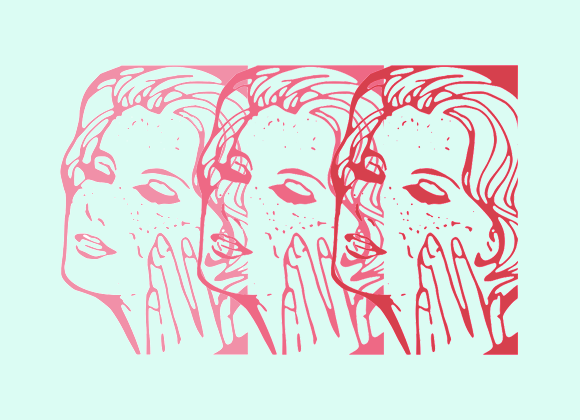Before he died, my granddad, who had mostly been up to that point lying very quietly in his hospital bed, shouted at me for biting my fingers. “For a clever girl,” he bellowed, “That’s a bloody stupid habit.” He was right, of course. That willowy Lancashire man, who gave up smoking overnight by sheer will alone, wouldn’t think much of me today, still picking my face, chewing my lips, worrying at the skin around my fingernails, drinking cup after cup of tea and smoking as if my mouth will seal up if I don’t put something in it.
One of the forms my mental illness takes is the way my hands find their way to my face, out of both destructive habit and desire to self-soothe. Since we have all been told to refrain from doing exactly that, I have been more aware of these behaviours than ever. Not only my own: my nail-biting boyfriend, the old lady licking her finger before she retrieves something from her bag, the tired eye-rubbing of the cashier bored of scanning through more toilet rolls than people need, more fish fingers, more paracetamol. Apparently, office workers touch their face an average of sixteen times an hour. I have touched my face five times since beginning this paragraph. In times of anxiety, these occurrences happen with increasing frequency. No doubt there’s a hair that needs retrieving from your face now, isn’t there?
I have very underdeveloped impulse control, and when my impulse is to pick or bite myself, like an animal in captivity, it often feels as if I have no choice but to do it, bloody stupid habit or not. Now we are all animals in captivity, the advice not to touch one’s own face seems to me ironic. The more I know there’s something I shouldn’t do, the more I want to do it. It’s more complex than my inherent need to do the opposite of what I’m told, and then again it isn’t—it’s indicative of a worrying, obsessional desire that takes hold of me in varying forms, throughout my days.
At its worst, I would often lose forty-five minutes to the act of touching, fallen into a strange trance, my mirror three inches in front of me, messages going unresponded to, tea going cold. Occasionally I would find myself unable to leave the house because of the damage I’d done. I would cancel dates abruptly, rudely, with little explanation. I’d fake illness or public transport failures beyond my control. More often, I’d pile make-up onto my scarred skin. I convinced myself I had to wear so much makeup because of my acne, but I didn’t have acne really. I had common or garden anxiety.
As a teenager, the GP gave me horrible smelling topical creams full of acid that I kept in the fridge and slathered all over my sore skin at night, after I had completed my excoriation. I was encouraged to wash my face more, something I took very much to heart. At my most anxious I have been known to wash my face ten or twelve times a day. I try in vain to direct this particular energy outwards, but it isn’t the same. I have heard strained jokes about getting someone with OCD tendencies round to sort out the kitchen. How fun! The trouble is that the thing that needs hot water, soap, scraping, scrubbing, is, for me, my body—the thing that I am trapped in.
My face-touching has improved over the last couple of years. I try not to look at myself too closely when I walk past a mirror, in case I see an imperfection. I don’t put mirrors in places that are too well-lit. I’ve banned myself entirely from the injurious pleasure of magnifying mirrors. Casual face touching continues, in ways I am both aware and unaware of, throughout the day. I rub my fingers over my chin to find an unplucked hair, I use my knuckle to manipulate my contact lens through my eyelid at the end of a long day, I scratch and rub and lick.
There are ways to limit the damage. Remember in series 2 of Friends when Phoebe gets chickenpox and Monica tapes oven gloves over her hands to stop her scratching? Sometimes I have to resort to such measures. I think I know, for example, where there is a box of powdered, disposable gloves for preparing fish in the kitchen. I could wear the delicate cotton gloves of a rare book dealer, handle my face and the faces of other people as if they were made of paper, brittle as onion skin, full of expensive passages of boring verse. Instead, laboriously, I bandage my thumbs and pick absentmindedly at the tape that binds them.
There are things I wish I didn’t know about my own face. I know that so-called eyelash mites live not only in between my eyelashes but also in the pores of my skin. A normal number of mites to carry is around two per eyelash, between hundreds and thousands of microscopic spider-like organisms. You transfer mites on sheets, pillows, towels.
It’s helpful to think about that currently, as we begin to suspect other people’s bodies of harbouring things that will cause us harm, flinching from usually benign contact. Intimacy is a tender ecosystem.
What it feels like to not be able to stop touching your face
I've prodded, poked and picked at my own skin for years. Now, my anxiety has become a matter of public health
March 19, 2020












